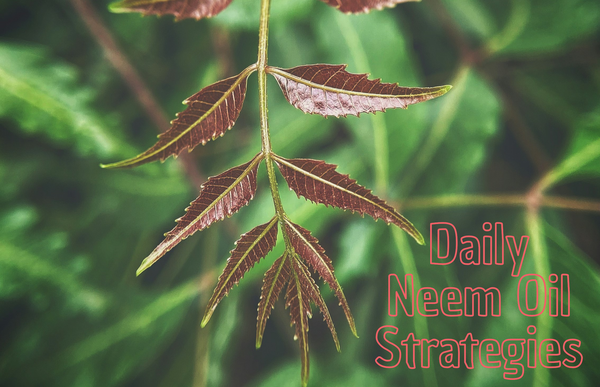Notifications
ALL BUSINESS
COMIDA
DIRECTORIES
ENTERTAINMENT
FINER THINGS
HEALTH
MARKETPLACE
MEMBER's ONLY
MONEY MATTER$
MOTIVATIONAL
NEWS & WEATHER
TECHNOLOGIA
TV NETWORKS
VIDEOS
VOTE USA 2026/2028
INVESTOR RELATIONS
COMING 2026 / 2027
ALL BUSINESS
COMIDA
DIRECTORIES
ENTERTAINMENT
FINER THINGS
HEALTH
MARKETPLACE
MEMBER's ONLY
MONEY MATTER$
MOTIVATIONAL
NEWS & WEATHER
TECHNOLOGIA
TV NETWORKS
VIDEOS
VOTE USA 2026/2028
INVESTOR RELATIONS
COMING 2026 / 2027
 ronak bedi -
Jan 23 -
Other -
agriculture
farming
neemz
neem oil pesticide price
-
443 views -
0 Comments -
0 Likes -
0 Reviews
ronak bedi -
Jan 23 -
Other -
agriculture
farming
neemz
neem oil pesticide price
-
443 views -
0 Comments -
0 Likes -
0 Reviews

Neem oil, derived from the seeds of the neem tree (Azadirachta indica), is an indispensable tool in sustainable agriculture. Its natural, biodegradable, and eco-friendly properties make it a preferred alternative to synthetic pesticides. Here are the top eight ways neem oil pesticide transforms agriculture while promoting environmental health.
Neem oil is highly effective in controlling various pests without harming beneficial insects. The active compound, azadirachtin, disrupts pests' growth and reproductive cycles, making it a sustainable option for pest control.
Neem oil works as follows:
Neem oil is particularly effective against thrips, leaf miners, and other stubborn pests, making it an ideal solution for protecting crops without polluting the environment.
Fungal infections, such as powdery mildew, leaf spot, and rust, are common crop threats. Neem oil is a natural fungicide that prevents spores from germinating on plant surfaces. By inhibiting fungal growth, neem oil reduces the need for chemical treatments, aligning with sustainable farming goals.
Neem oil contributes to healthier soil by:
Healthy soil forms the foundation of sustainable agriculture, and neem oil's natural properties help maintain fertility.
Neem oil pesticide is especially beneficial for high-value crops such as vegetables, fruits, and ornamental plants. It protects against pests like whiteflies and aphids, which can cause significant economic losses.
A single application can safeguard crops without harming pollinators or the surrounding ecosystem, making it a cost-effective solution for farmers. For water-soluble options, Neemz - natural and water-soluble neem oil ensures easy application and improved results.
Unlike chemical pesticides, neem oil degrades quickly in the environment, leaving no harmful residues. It is safe for humans, pets, and wildlife. Farmers can reduce their reliance on synthetic chemicals by choosing neem oil, decreasing pollution in soil and water systems.
“Sustainability in farming isn’t just about reducing harm—it’s about fostering a healthy relationship between agriculture and nature.”
Neem oil aligns with this principle by offering an eco-conscious solution that works with nature rather than against it.
Neem oil targets over 200 pests, including thrips, leaf miners, and bugs. Its broad-spectrum efficacy allows farmers to manage infestations efficiently while avoiding the overuse of multiple chemical pesticides.
In addition to repelling insects, neem oil disrupts pests’ life cycles, reducing their reproduction ability. This dual action ensures long-term pest control while safeguarding the environment.
Neem oil seamlessly integrates into IPM strategies, combining multiple pest control methods for maximum efficacy. When applied correctly, it works well alongside natural predators and beneficial insects, as it doesn’t harm bees, ladybugs, or butterflies.
Farmers can use neem oil as a preventive measure, reducing the likelihood of pest outbreaks. This adaptability makes it an essential tool in modern sustainable farming practices.
Healthy plants yield better crops. Neem oil improves plant vigor by reducing stress caused by pests and diseases. With fewer infestations, plants allocate more energy to growth and fruiting, leading to:
This boost in productivity is significant in regions where farming is the primary source of livelihood.
Neem oil pesticide plays a vital role in making agriculture more sustainable, protecting crops, and preserving natural resources. Its versatility, eco-friendliness, and effectiveness against pests like whiteflies, aphids, and bugs make it an invaluable resource for farmers worldwide. By incorporating neem oil into farming practices, you take a significant step toward greener, healthier agriculture.
